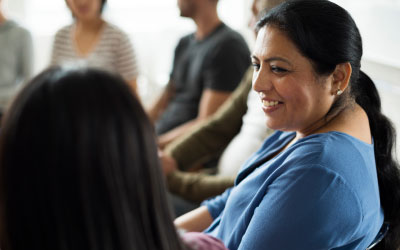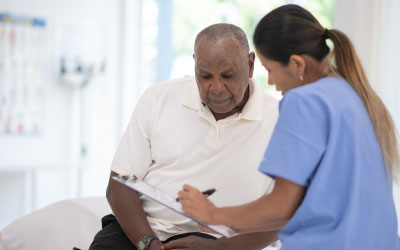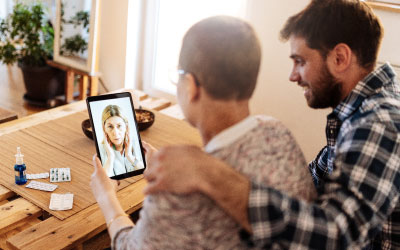Caring for Yourself
Nutrition
Fruits, vegetables, lean proteins, and whole-grains give you more strength than processed foods can. They can also help you manage treatment side effects, maintain a healthy weight, and lower your risk of infection. A steady dose of good food may even speed up your recovery time.
Since cancer and treatment can weaken your immune system, be careful with raw foods -- always wash fruits and vegetables and stick to pasteurized products.
Drink plenty of fluids (about eight 8-ounce glasses a day) to keep your body’s minerals in balance. If you are experiencing vomiting or diarrhea, increase your fluid intake to prevent dehydration.
Here are some links to healthy eating tips and recipes for cancer patients.
Exercise
Exercise is an essential part of a cancer treatment plan. Research shows that regular exercise can significantly improve physical and mental health during every phase of treatment.
If you’re new to exercise, check with your doctor before beginning. Start slow, and build up to 30 minutes a day. If you were physically active before treatment, you might not be able to follow the same exercise routine as before. It will take time to return to your pre-cancer fitness level.
In general, a variety of exercises are the key to a safe and effective program during and after cancer treatment. A complete program will usually include breathing, balance, stretching, aerobic, and strength training exercises.
- Breathing exercises: These exercises help move air in and out of the lungs, which can improve your endurance. Breathing can also reduce stress and anxiety. Here’s a sample exercise you can try: Inhale for five seconds, filling up your chest with air. Exhale from the lower abdomen for five seconds, pressing your belly button toward your spine. Imagine all of your tension and stress leaving your body each time you exhale.
- Balance exercises: Loss of balance can be a side effect of cancer and its treatment. Balance exercises can help you regain the function and mobility you need to safely return to your daily activities. Maintaining good balance also helps prevent falls or other injuries. Here are some balance exercises recommended by Cancer.Net.
- Stretching: Stretching can improve your flexibility and posture. It helps increase blood and oxygen flow to the muscles and helps your body repair itself.
- Aerobic exercise (cardio): Aerobic exercise raises your heart rate, strengthening your heart and lungs. Walking is one of the easiest ways to get aerobic exercise. You may only be able to walk for a few minutes at first, but be patient with yourself. Try to walk a little farther each time until you’re able to do 30 to 45 minutes per day.
- Strength training: Muscle loss happens when you are less active during cancer treatment and recovery. Strength training helps you build strong muscles which can improve your balance, reduce fatigue, and make it easier to do daily activities. Here are some strength training tips from Cancer.Net.
Emotional health
A cancer diagnosis can affect the emotional health of patients, families, and caregivers. Common feelings during this life-changing experience include anxiety, distress, and depression.
Below are some things you can do yourself to manage these feelings. It’s important to recognize when these emotions are overwhelming and too much for you to manage alone. Don’t be afraid to ask for help and get emotional support.
- Set small goals for yourself and build them up slowly. To start, your goal might be walking around the block once or calling a friend to chat. Pat yourself on the back for every task you manage to do each day. You shouldn’t expect to feel better overnight. Feeling better takes time and happens gradually.
- Practice relaxation techniques. Meditation, yoga, visualization, and hypnotherapy are a few techniques that can help you relax and cope with episodes of anxiety, fear, and depression. The American Cancer Society offers a great guide to relaxation techniques after cancer treatment.
- Draw or write in a journal. Writing down your feelings can be a great release. Drawing and painting is also an excellent way to express emotions.
- Ask for help. If your feelings keep you from doing your everyday activities, you may want to consider a support group or meeting one-on-one with a counselor. For more information on emotional support, visit our Getting Support webpage.



